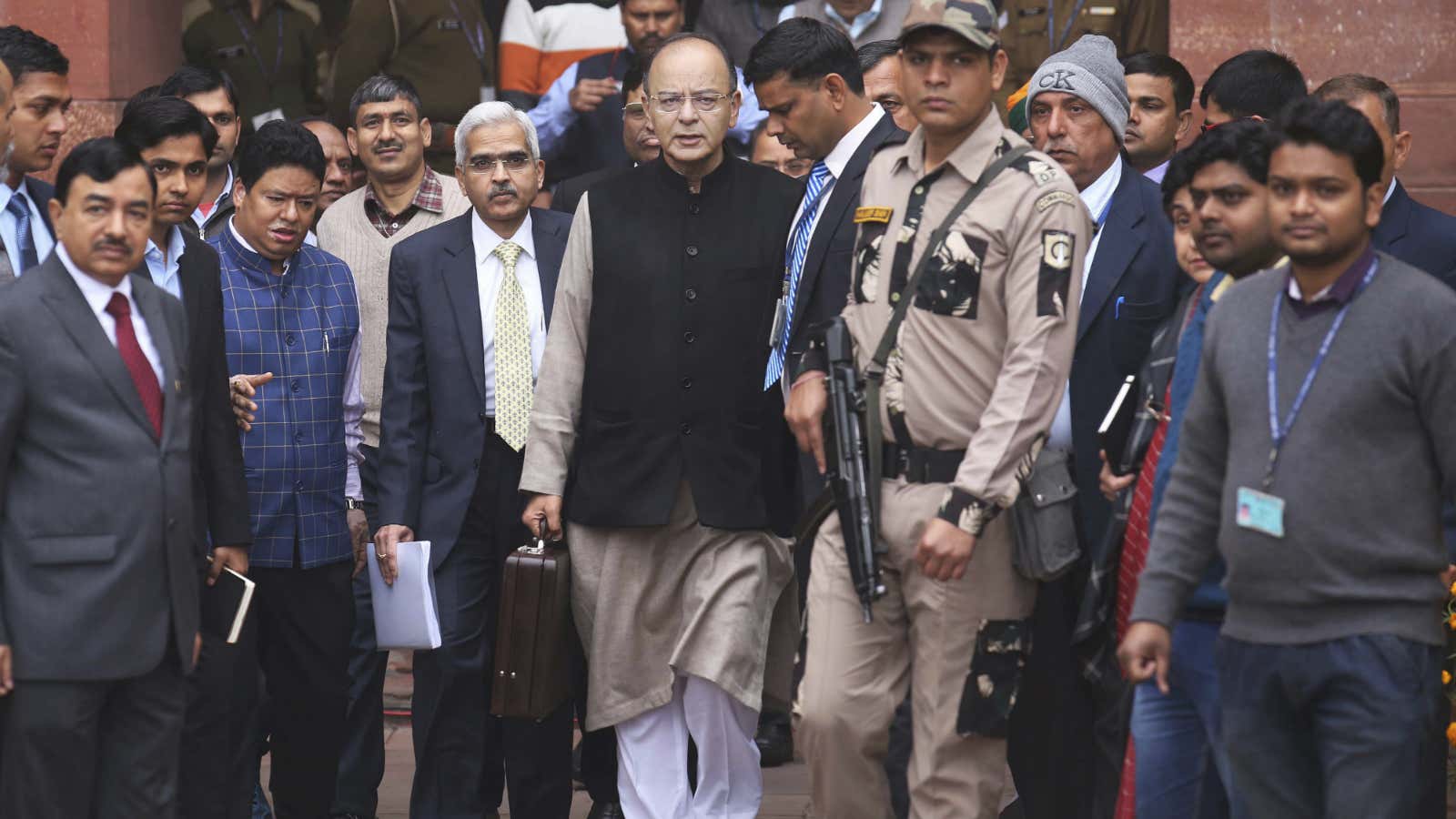Just seven out of every 100 voters in India pay taxes. Only a handful of countries, such as Mexico and Indonesia, have a worse record, the newly-released Economic Survey 2017 notes in its chapter titled “Eight Interesting Facts About India.”
In his budget speech for 2017-18, Indian finance minister Arun Jaitley reiterated the need to improve India’s tax-to-GDP ratio. Almost three-fourth of his way into the speech in parliament, he packed in some trivia that underscored the extent of tax evasion in Asia’s third-largest economy.
“The number of people showing income more than Rs 50 lakh in the entire country is only 1.72 lakh,” he said. “We can contrast this with the fact that in the last five years, more than 1.25 crore cars have been sold, and number of Indian citizens who flew abroad, either for business or tourism, is two crore in the year 2015.”
Here are some excerpts from Jaitley’s budget speech, which highlight the urgent need to increase tax compliance in the country:
India’s tax-to-GDP ratio is very low, and the proportion of direct tax to indirect tax is not optimal from the view point of social justice. I place before you certain data to indicate that our direct tax collection is not commensurate with the income and consumption pattern of Indian economy. As against an estimated 4.2 crore persons engaged in organised sector employment, the number of individuals filing return for salary income is only 1.74 crore. As against 5.6 crore informal sector individual enterprises and firms doing small business in India, the number of returns filed by this category is only 1.81 crore. Out of the 13.94 lakh companies registered in India upto 31st March, 2014, 5.97 lakh companies have filed their returns for assessment year 2016-17. Of the 5.97 lakh companies which have filed their returns for assessment year 2016-17 so far, as many as 2.76 lakh companies have shown losses or zero income. 2.85 lakh companies have shown profit before tax of less than Rs1 crore; 28,667 companies have shown profit between Rs1 crore to Rs10 crore, and only 7,781 companies have profit before tax of more than Rs10 crores.
Among the 3.7 crore individuals who filed the tax returns in 2015-16, 99 lakh show income below the exemption limit of Rs2.5 lakh p.a.; 1.95 crore show income between Rs2.5 to Rs5 lakh; 52 lakh show income between Rs5 to Rs10 lakhs, and only 24 lakh people show income above Rs10 lakhs. Of the 76 lakh individual assesses who declare income above Rs5 lakh, 56 lakh are in the salaried class. The number of people showing income more than Rs50 lakh in the entire country is only 1.72 lakh.
We can contrast this with the fact that in the last five years, more than 1.25 crore cars have been sold, and number of Indian citizens who flew abroad, either for business or tourism, is two crore in the year 2015. From all these figures we can conclude that we are largely a tax non-compliant society. The predominance of cash in the economy makes it possible for the people to evade their taxes. When too many people evade taxes, the burden of their share falls on those who are honest and compliant.
After the demonetisation, the preliminary analysis of data received in respect of deposits made by people in old currency presents a revealing picture. During the period 8th November to 30th December 2016, deposits between Rs2 lakh and Rs80 lakh were made in about 1.09 crore accounts with an average deposit size of Rs5.03 lakh. Deposits of more than Rs80 lakh were made in 1.48 lakh accounts with average deposit size of Rs 3.31 crores.
This data mining will help us immensely in expanding the tax net as well as increasing the revenues, which was one of the objectives of demonetisation.
